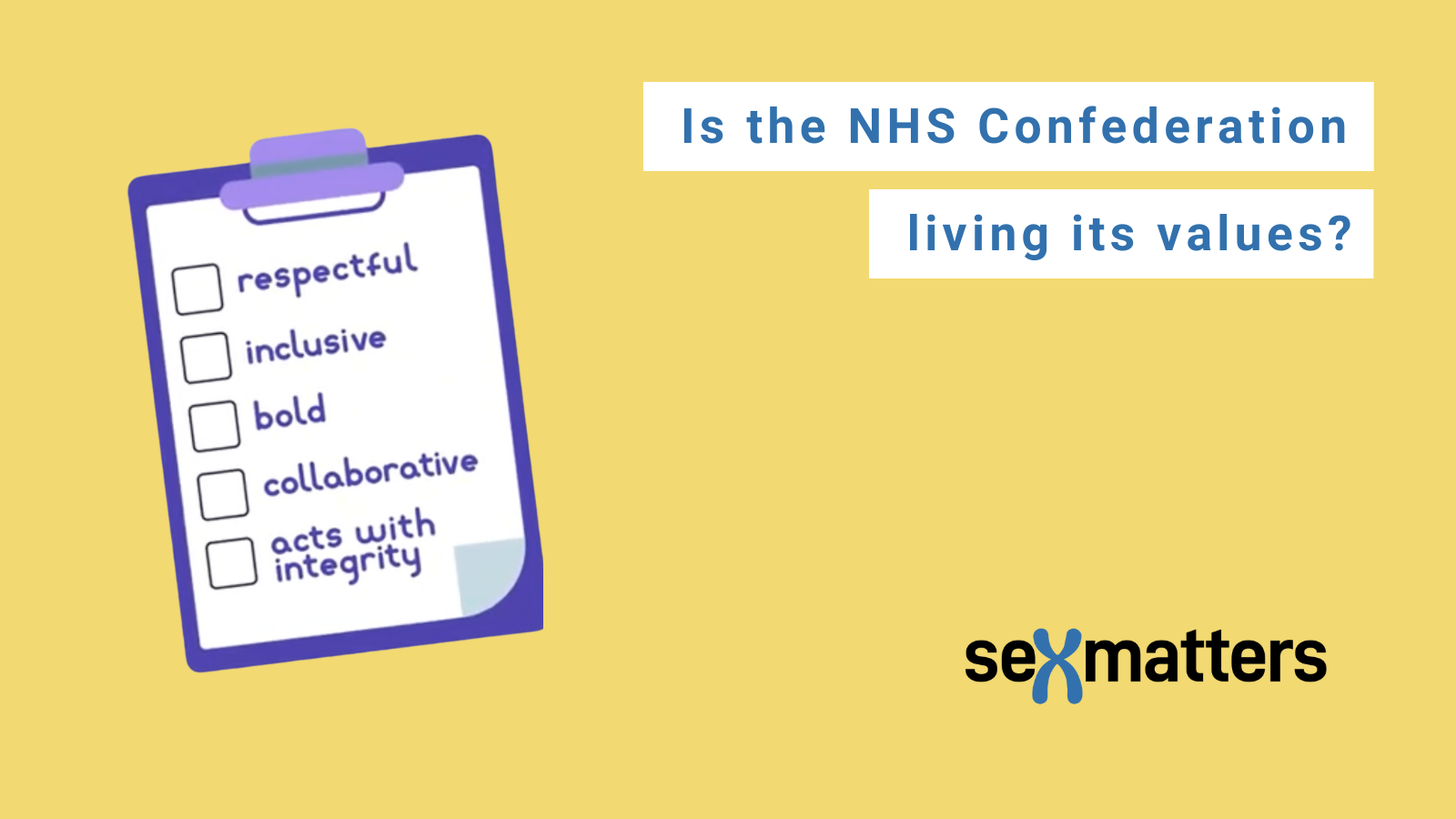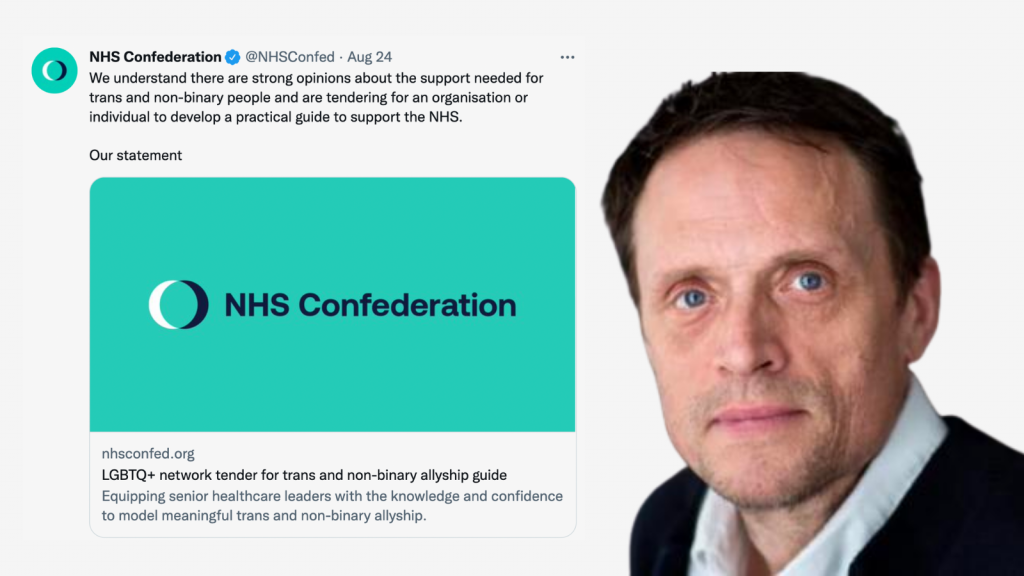NHS Confederation: leadership needed

“It is now — not the good times — where all that work you did on purpose and values matters. Like a winter coat, integrity is only tested in storm.”
Matthew Taylor
The NHS Confederation is the membership body for NHS services in England, Wales and Northern Ireland. Its members employ over 1.5 million staff, care for more than a million patients a day and control £150 billion of public expenditure. It recently sought bids for a piece of work to create:
“a practical guide for senior healthcare leaders, equipping them with the knowledge and confidence to model meaningful trans and non-binary allyship. The guide should also include ideas for supporting NHS organisations when they face opposition from anti-trans groups and individuals.”
The Confederation’s Health and Care LGBTQ+ Leaders Network had already staked out a partisan position in June 2021, issuing a statement (not long after the EAT judgment in Forstater, which found that gender-critical views are “worthy of respect in a democratic society”) saying that
“The human rights of LGBTQ+ leaders, staff and patients are not negotiable.”
This is wrong. Some human rights, including the right to life, the right not to be tortured and the right to a fair trial, are indeed non-negotiable. Others, such as the right to information privacy, freedom of expression and the right to manifest a belief, are subject to qualifications, and need to be balanced against other people’s rights and the proper functioning of society and organisations.
The leaders of NHS bodies need a support organisation that holds fast to the principles of universal human rights, not one that surrenders to an absolutist movement that declares its demands to be non-negotiable.
The NHS Confederation’s response
We wrote to the NHS Confederation, asking it to reconsider its invitation to tender. On 24th August it responded with a “No”:

Its terse statement says:
“This tender is a response to requests from our members to support them to be better allies to trans and non-binary staff working in the NHS.
“They are looking for advice and guidance that falls within the confines of regulation, and this is one of a range of activities the NHS Confederation is undertaking to address the challenges faced by those with protected characteristics.”
This downplays the problems with the tender and does not address the criticisms. The NHS Confederation’s leadership is ploughing on with the project.
The NHS Confederation’s values
Matthew Taylor, the CEO of the NHS Confederation, is someone who has spent many years thinking about leadership and about the values and purpose of organisations.
The NHS Confederation has a series of stated values.

Under respectful, it says: “We recognise the diversity of views, and we listen to understand.”
- The invitation to tender demonstrates contempt and hostility towards gender-critical voices, which it brands “anti-trans”. There is no sign of listening to understand.
Under inclusive: “We continuously strive to be a diverse organisation – we encourage different ideas, strengths, interests and experiences.”
- The invitation to tender actively excludes gender-critical ideas and the strengths, interests and experiences of those who recognise that sex matters in women’s and men’s lives and their healthcare.
Under acting with integrity: “We are all accountable for our work and learn from our mistakes.”
- The statement shows a fixed determination not to acknowledge the mistakes inherent in the invitation to tender, defending it as seeking advice which “falls within the confines of regulation”. It does not. If it did, the organisation would have given proper consideration to the Nolan Principles and the rights of others. It would not have sought advice on how to respond to Freedom of Information requests about trans policies, which is difficult to interpret in any other light than as a search for ways to evade public accountability.
Under collaborative: “We are a diverse organisation with a diverse membership and recognise and value each other’s strengths.”
- The tender seeks to crush diversity of view, and to demonise those with gender-critical views rather than recognising and valuing their strengths.
The values statement says:
“We are committed to ensuring that everyone who encounters the NHS Confederation experiences a safe, welcoming and inclusive environment, where everyone is respected and valued, and professional boundaries are upheld.”
Staff within the NHS and NHS Confederation include:
- women who do not want to share showers and changing rooms with male colleagues, some of whom will be survivors of sexual assault, some of whom may be religious, and all of whom are entitled to their own boundaries
- lesbians and gay men who do not accept that men can identify as lesbians or women as gay men
- “trans widows” and the children of transitioners, who are dealing with the fallout from someone else’s cross-sex identification in their own lives
- parents who are distraught that their child has become caught up in the idea of being “born in the wrong body” and wants to take drugs that will stunt their physical, cognitive and emotional development and leave them sterile.
Above all, the confederation’s purpose is to serve dedicated NHS professionals, who need to be be able to think, speak and use data truthfully about people, who come in two sexes.
These professionals are not made to feel safe, welcomed, included, respected or valued by a programme of enforced allyship, which they recognise as authoritarian and which requires compliance with whatever demands transactivists make. Many of them feel terrified.
In order to respect everyone’s rights and pursue organisational goals, NHS Confederation staff, and staff in NHS bodies, need to be able to think both critically and compassionately about everyone’s needs and to find workable solutions.
The Confederation has allowed its LGBTQ network to pursue an approach that is out of line with its values and purpose, and which will encourage NHS organisations to act unlawfully and to discriminate against those who are “gender-critical”. It is an approach that undermines the ability of NHS staff to do their jobs.
Because the transactivist movement has been so effective in silencing dissent, it has perhaps been easy for busy leaders to overlook the problem. But continuing to appease the movement will not advance respect or inclusivity. Rather, it will destroy the culture of public service within the NHS.
What should Matthew Taylor and the Board of Trustees do?
The leaders of the NHS Confederation now have a choice. Find the courage to bring the organisation back to its values and principles; or continue to capitulate to the unreasonable and unlawful demands of its LBTQ+ network and hope that the problem goes away.
The value the NHS Confederation most needs now in its leader is boldness: “We encourage and support staff to feel confident in expressing themselves and having difficult conversations“.
Matthew Taylor should lead the NHS Confederation in having these difficult conversations.
- Withdraw the flawed invitation to tender on “trans allyship” and publicly state the reasons for doing so
- Investigate how this invitation to tender came to be published
- Contact the organisations alluded to in the invitation to tender as “anti-trans”, and arrange to meet them and listen to their concerns.
